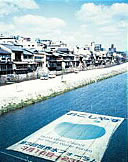 |
| Different ways of sending out the message about sustainable water use |
"The world is in a water crisis that will only grow more acute and
devastating in coming years unless governments start giving higher priority
to water in their development and investments plans”, says William
Cosgrove, Vice President of the World Water Council. "Water is not
a commercial product like any other, but rather a heritage which must be
protected, defended, and treated as such”, agrees Koos Richelle, Director
General for Development at the European Commission. At the Kyoto conference
Europe Day, Richelle presented the EU Water Framework Directive, which is
based on the principle of integrated river basin management to achieve a
good status of all surface, ground- and coastal waters by 2015. The model
character of the Danube River Basin in this regard was underlined in a presentation
given in Kyoto by Joachim Bendow, executive secretary of the ICPDR.
Philippe Roch from the Swiss Agency for the Environment, Forests and Landscape,
presented the new agreement reached under the auspices of UNEC for Europe
on civil liability for damage caused by industrial accidents on transboundary
waters. The proposal to draw up this binding instrument was first made in
the wake of the accidents at a tailings dam at Baia Mare, Romania, in January
2000, when cyanides and heavy metals polluted almost 2,000km of rivers in
the Danube Basin.
Progress on the EU Water Initiative "Water for Life”, a partnership
to help countries achieve the water and sanitation targets agreed at the
World Summit on Sustainable Development, in Johannesburg, was also discussed
in Kyoto. The Water Initiative will ensure investment in areas of greater
need, such as Africa, Eastern Europe, the Caucasus and Central Asia. The
EU is already investing EUR 1.4 bn a year in water-related development aid
and scientific co-operation. "The water crisis is a crisis of governance.
This initiative promotes better water governance arrangements and transparency,
building stronger partnerships between governments, civil society, and the
private sector. Effective public services are a basis for sustainable water
governance, and transboundary co-operation is an investment into peace and
stability”, says Richelle.
 |
| 3rd World Water Forum logo floats in the Kamo River in Kyoto |
But water for peace is exactly what the forum failed to deliver, believes
Mikhail Gorbachev, former Soviet president and president of Green Cross
International. Expressing his disappointment at the final outcome of the
Ministerial Conference held in parallel to the Forum, Gorbachev said that
"the Ministerial Declaration agreed in Kyoto is a weak document, with
few identifiable new commitments or proposed mechanisms for translating
already stated goals into actions”. Other environmental organisations
were also critical of the Ministerial Declaration. The World Conservation
Union (IUCN) says the ministers produced a "watered-down” document.
WWF was even more critical, condemning governments for their failure to
commit to actions to ensure adequate water supply and sanitation.
Organisers believe, however, that the Forum was fruitful and that it even
exceeded the initial expectations. Cosgrove agrees that consensus couldn’t
be reached on the two most delicate issues, large dams and privatisation
of water facilities, but proudly points out the more than 100 new commitments
towards bringing safe water and sanitation to the entire world.